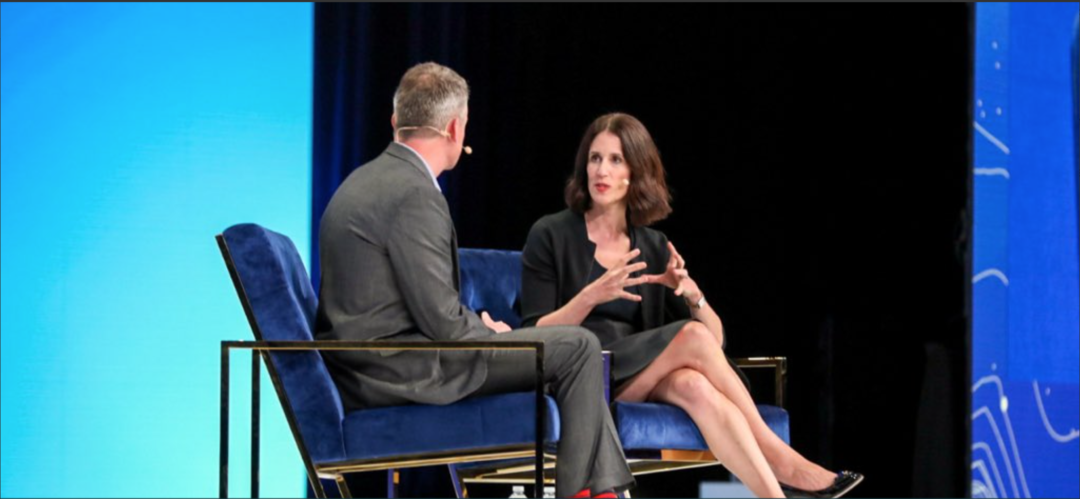“What should we expect from technology,” asks the SVP and chief marketing officer of IBM, Michelle Peluso?
This was the motivation behind her and IBM’s Dear Tech, campaign.
It seeks to ask the questions that need to be addressed as technology’s impact on our social and business lives only becomes more pervasive: is tech going to work everybody, or the few? Will AI create social good, or harm workers livelihoods?
“It’s the right time to have a conversation about what we can expect from technology,” said Peluso during a Q&A with the CMO of Okta, Ryan Carlson, at Oktane19 in San Francisco.
https://www.youtube.com/watch?v=gNF8ObJR6K8
IBM – the 108-year-old technology brand
The first point of discussion centred around the core values of a technology company that has been around for over 100 years.
“How do you retain what’s special,” asked Carlson?
Peluso identified three areas. It’s important for “us to stay at the forefront of innovation and ask questions surrounding what technology matters and what is hype,” she said. This all comes down to research.
The second area surrounds ensuring IBM continues to be industry experts. And, this requires hundreds of thousands of consultants in hundreds of different fields.
The final area concerns trust and responsibility – “how do you usher in new technologies and prepare society,” asked Peluso?
“The brand is an expression of these three areas,” she continued.
Brand and culture should be inextricably linked. And, there is something fundamental about the IBMer — “we’re always looking towards what’s next,” said Peluso.
But, are values do not change. Regarding inclusion and diversity, IBM “established equal pay rules in 1930s and a non-discrimination policy in 1950s,” according to Peluso. They were certainly pioneers in this regard.
“My job is to be a steward of this ethos and maintain it, but also drive change. The conversation now is even more important than back then,” she said.
It certainly is, and while diversity covers many areas, from a gender perspective, the number of women in tech is falling.
In general, a large number of organisations do not see diversity as a priority; despite the obvious business benefits and knowledge that it is the right thing to do – to break stereotypes and get more minority groups into the tech industry.
Advancing women still not a priority for global organisations — IBM
Digital transformation
At the beginning of the internet era, digital transformation surrounded how do you change the customer experience, or as Peluso described it, “the periphery of the company”.
Companies have been playing catch up with this idea for the last 20 years.
Now, companies are taking an inward-outward approach, whereby they can digitise workflows and internal operations.
“This is much more interesting and much harder work,” explained Peluso: “how do we take advantage of the data we have,” she asked?
The term, no doubt, has been dramatically overused. But, if we were to classify digital transformation: the first iteration would be changing the customer experience and the second is “how do we change ourselves”.
Tim Berners-Lee on the World Wide Web: “it seemed like a good idea at the time”
The responsible use of tech
Organisations must use technology responsibly, because of the amount of personal data that has been collected. “It is the fundamental difference now,” continued Peluso.
Organisations now have so much more information on each of us and our environment, with biometric data, for example.
Those who harness this data will lead the way, but ethical challenges arise. And with this, IBM has come up with ethical parameters that must be respected, according to Peluso: “AI must augment and not replace, AI models must be transparent, traceable and must have positive societal impact. The data is your data.”
Trust at Oktane19: the new frontier in technology
The CMO role at IBM
At its best, marketing “has the intuition of humanity, the graceful understanding of what people need and want,” eloquently put Peluso. “Now, the marketers role is being backed by science and data. This matches that intuition with the powerful use of data.”
At IBM, she leads 10,000 people. And was charged with combining tech and software engineering into marketing.
The ambition was to go full scale into agile as a discipline.
“We needed to change the whole operation of marketing and even reimagine the office space,” she said.
“There was a huge amount of structural change, with six months required agile training.
“Many struggled and we lost plenty of marketers,” Peluso honestly conveyed.
However, once agile was instilled as a discipline, employee engagement skyrocketed. And, marketers with agile training are invaluable.










